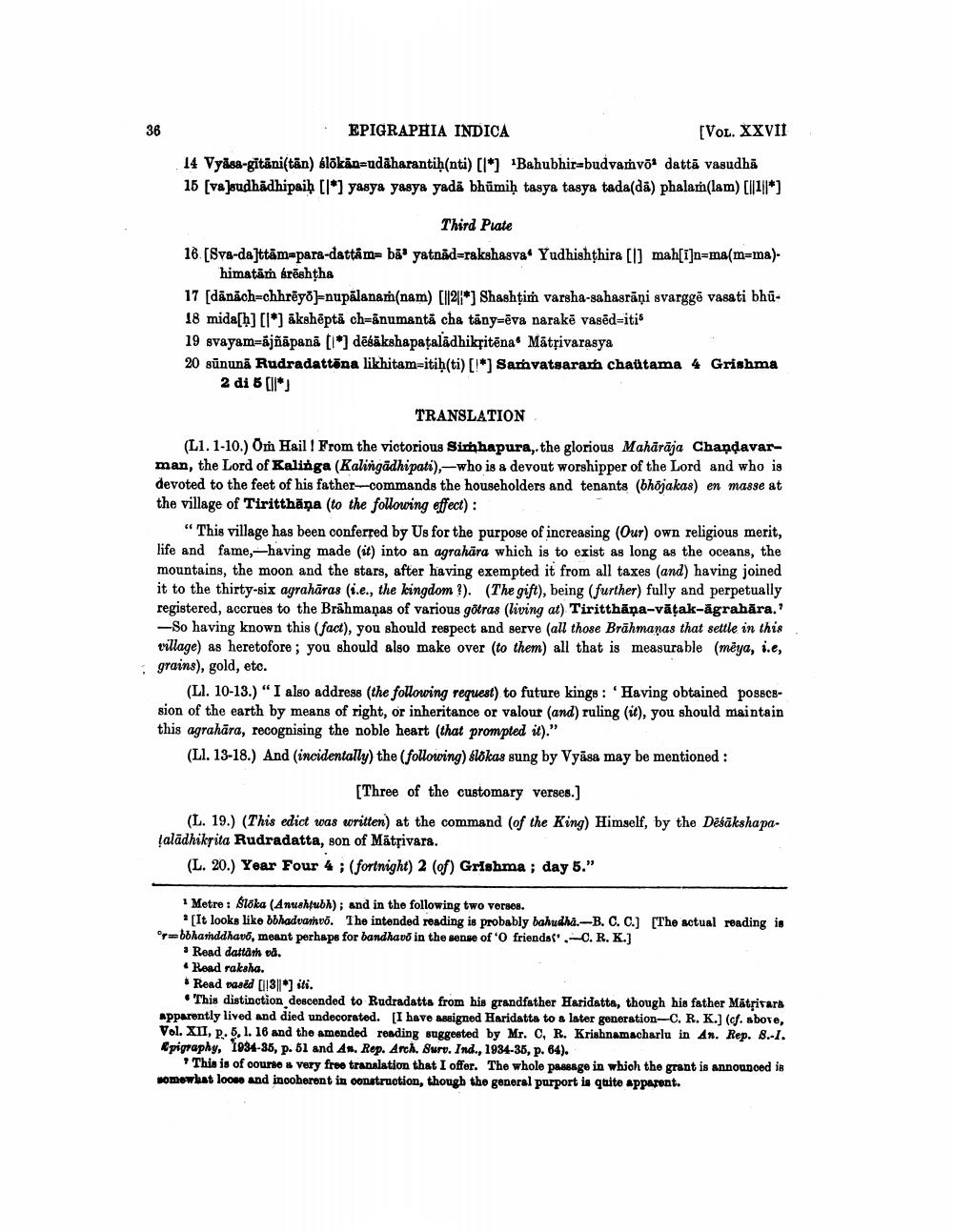________________
EPIGRAPHIA INDICA
[Vol. XXVII 14 Vyāsa-gītāni(tan) slökān=udaharantih(nti) [1*1 Bahubhir-budvaṁvõt dattā vasudhā 15 [va]sudhādhipaiḥ [l*) yasya yasya yadā bhūmiḥ tasya tasya tada(da) phalam(lam) [|1111*]
Third Plate 16.Sva-da]ttām-para-dattām= bã yatnād=rakshasva Yudhishthira [1] mah[i]n=ma(m=ma).
himatām krēshtha 17 [dānãch=chhrēgoj-nupālanam(nam) [121] Shashtim varsha-sahasrāņi svarggē vasati bhū18 mida[h] [l*] ākshēptā chránumantă cha täny=ēva narakė vasēd=itis 19 svayam=ājñāpanā ti*] dēsākshapatalādhikritēna Mātrivarasya 20 sūnunā Rudradattöna likhitam=itih(ti) [*1 Samvatsarath chautama 4 Grishma
2 di 5 [11*)
TRANSLATION
(L1. 1-10.) Om HailFrom the victorious Simhapura, the glorious Mahārāja Chandavarman, the Lord of Kalinga (Kalingadhipati),--who is devout worshipper of the Lord and who is devoted to the feet of his father--commands the householders and tenants (bhojakas) en masse at the village of Tiritthāņa (to the following effect) :
"This village has been conferred by Us for the purpose of increasing (Our) own religious merit, life and fame,having made (it) into an agrahāra which is to exist as long as the oceans, the mountains, the moon and the stars, after having exempted it from all taxes (and) having joined it to the thirty-six agrahāras (i.e., the kingdom ?). (The gift), being further) fully and perpetually registered, accrues to the Brähmanas of various götras (living at) Tiritthāņa-vātak-āgrahāra.' -So having known this fact), you should respect and serve (all those Brāhmaṇas that settle in this village) as heretofore; you should also make over to them) all that is measurable (mēya, i.e, grains), gold, etc.
(Ll. 10-13.) "I also address (the following request) to future kings : Having obtained posscesion of the earth by means of right, or inheritance or valour (and) ruling (it), you should maintain this agrahāra, recognising the noble heart that prompted it)." (Ll. 13-18.) And (incidentally) the following) slökas sung by Vyāsa may be mentioned :
[Three of the customary verses.] (L. 19.) (This edict was written) at the command (of the King) Himself, by the Dēsākshapaļaladhikrita Rudradatta, son of Mätsivara.
(L. 20.) Year Four 4 ; (fortnight) 2 (of) Grishma ; day 5."
1 Metre : Sloka (Amushrubh); and in the following two vorses.
[It looks like bbhadvarhvö. The intended reading is probably bahudha.-B. C. C.) [The actual reading is bbharddhavo, meant perhaps for bandhavo in the sense of 'o friends'.-O. R. K.) * Read dattath ed. Road rakaha.
Read vased 01311] iti.
• This distinction descended to Rudradatta from his grandfather Haridatta, though his father Mätgivara apparently lived and died undecorated. [I have assigned Haridatts to a later generation--C. R. K.) (cf. above, Vol. XII, P.6, 1. 16 and the amonded ronding suggested by Mr. C, R. Krishnamacharlu in An. Rep. 8.-I. pigraphy, 1934-85, p. 61 and An. Rep. Arch. Suru. Ind., 1934-36, p. 64).
* This is of course a very free translation that I offer. The whole passage in which the grant is announced is womewhat loose and inooherent in construction, though the general purport is quite apparent.




